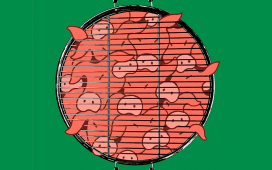This article originally appeared on Vogue.
On Tuesday afternoon, at just after 5 p.m., the jurors in the trial of Derek Chauvin announced their verdict, unanimously finding Chauvin guilty on all charges of killing unarmed Black father George Floyd last May after less than a full day of deliberation.
There had been much speculation about whether the jury would find Chauvin guilty, as well as whether the case could potentially end in a mistrial (which would have let Chauvin go free) or a hung jury (in which jurors wouldn’t be able to reach a consensus on a “guilty” or “not guilty” verdict).
Chauvin had been charged with three different types of homicide—second-degree murder, the most serious of the charges, as well as third-degree murder and manslaughter—and could have been convicted on all three, or any one or two of three, according to Gideon Yaffe, a professor of law, philosophy, and psychology at Yale University, who Vogue spoke to just before the verdict was delivered.
According to Yaffe, the conviction rested on a few factors: “If the jury thinks that he illegally assaulted Floyd, and that the assault caused Floyd’s death, then he would be guilty of the most serious of the three offenses. The other two charges turn on what was in Chauvin’s mind when he was kneeling on Floyd’s neck.” The conviction could bring with it a sentence of up to 40 years, with sentencing scheduled from eight weeks from the April 20th trial. Bail was revoked, with Chauvin scheduled to remain in police custody until then.
As Yaffe notes, “cases in which police kill people in the course of trying to arrest them are very rarely criminally prosecuted.” Wrongful death lawsuits are far more common and are usually settled out of court. “More common is for there to be private wrongful death lawsuits brought by the family members of the deceased,” says Yaffe, adding, “Those are usually either settled before trial, or they lose in court because of special laws designed to protect police from civil liability for harms they cause while on the job.
The verdict follows a year of protests that began last summer, with the U.S. erupting in protests Floyd’s killing. On Monday, President Joe Biden called Floyd’s family to express his sympathy, calling the evidence against Chauvin “overwhelming.”
Get the best of what’s queer. Sign up for them.’s weekly newsletter here.








